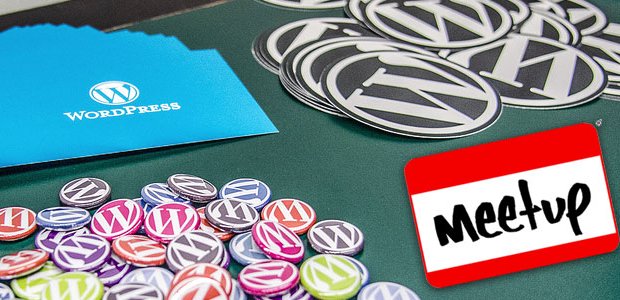
Meetups are a fabulous way to get out and be social. Y’know, the real social: physically, in person, face-to-face. No “Like” buttons, no upvotes.
When I moved to Toronto in 2010, I went straight to Meetup.com to see if there were any groups in the city that could help me make some connections. That’s where I found WPToronto.
At the time, it was a small, informal, back-of-the-pub group, but we grew in the following years. I became a co-organizer in 2011, and then took on the lead organizer role in 2013.
The experience taught me something valuable:
Organizing a meetup is a great way to contribute to WordPress without writing any code.
I stepped down from the lead organizer role in September, and am currently trying to put together some resources that other organizers can use. 🙂
Here’s the process we go through for our local meetups. If you’re interested in starting a group of your own, I hope this’ll come in handy for you!
1. Choose a topic.
The focal point of your meetup, the “hook” that draws people to the event. Different topics will appeal to different kinds of members.
2. Choose a format.
We’ve typically fallen back to one of five types:
- Social: No agenda, just getting together for food or drink and friendly banter.
- Presentation(s): Like a session at a conference, complete with speakers, slides, even panel discussions.
- Workshop: Mix of presentation with hands-on work. Notoriously difficult to execute in a short amount of time.
- Working Sessions: Mix of a workshop and social. Attendees bring their laptops and work on their projects.
- Hybrid: Mix of different types. Classic example is a presentation + social (a few speakers followed by food and drink), or presentation + working session. Choose whatever works.
3. Find a suitable venue.
This can be a frustration for organizers. As your group grows, you’ll have a harder time finding appropriate locations. This is one reason why many larger meetups charge an RSVP fee. Bigger spaces cost money, and it’s not fair/feasible for the organizer to pay out of pocket.
Things to consider when finding a venue:
- How much space do you need?
- What equipment do you need? Chairs? Tables? A/V?
- What’s provided by the venue, if anything?
- Are food and drink available? Can people bring their own?
- Accessibility: Are there stairs? An elevator? Is there enough room for wheelchairs?
- Who is your primary contact? When can they be reached?
4. Note the location and transportation options.
This goes hand-in-hand with the venue requirements, but is a bit more flexible.
- What area of the town/city is the venue in? What’s the address?
- What’s the nearest major intersection?
- Is there parking nearby? What’s the price?
- How do people get there by public transit?
- How do you get into the venue? What entrance? Any signage?
5. Determine your equipment and supply requirements.
Create a list of your necessities and nice-to-haves. Basic furnishings (chairs and tables) are pretty standard for venues. Projectors and projection screens are less common, as are extension cords.
If these supplies are available from your venue, take advantage of them. Otherwise, start putting together a “kit” for your meetups. (I like using a portable tote or filebox for this.)
- Laptop & Projector
- Projection Screen (although a blank wall works just fine)
- Extension Cables/Power Bars
- Pens & Paper for attendees to take notes
- Name Badges
- Business cards for the meetup group
- Cash Box
- Signage
6. Will there be an after-event?
If you’re hosting a more formal meetup, like a presentation or workshop, having a smaller get-together after the event is a nice way to relax and socialize.
This is where the real one-on-one mingling happens, over drinks or food with everyone gathered around a table. It’s how a sense of community builds up with your regular members.
Consider:
- Pub? Cafe? Diner? Restaurant? We usually go for pubs or cafes because of the ample seating and casual atmosphere.
- Announced or discrete? Do you want to announce the after-event as part of the meetup, or only mention it to those who show up?
- Making Reservations? If you’re expecting a larger group, have some courtesy and call ahead. Keep in mind that your numbers may change, though.
7. Dealing with RSVPs.
RSVPs are tricky. You can have 100 people register and only 50 show up. Or 80. Or 20. It varies wildly, depending on weather, and conflicting events, and traffic, and sometimes I even wonder if planetary alignment has anything to do with it…
The point is that it’s difficult to predict exactly what your turnout is going to be like. To help ballpark, we’ve got a rule of thumb based on previous experiences:
- Free events: 50-75% turnout.
- Paid events: 75-90% turnout.
You’ll see a bump in RSVP changes the night before and day of an event.
8. Handling costs.
Running a meetup group takes time and money. Meetup.com charges organizers a recurring fee, and many venues will charge for booking. There are costs for equipment and supplies, not to mention the hours you’ll put into running the group.
Some organizers put up with this and cover costs out-of-pocket, treating it much like a hobby. Businesses that run meetups may treat them as a marketing expense. You can also accept donations or sponsorships (monetary or in-kind) to subsidize or completely cover expenses.
The other option is to charge attendees during online registration or at the door. (Somewhere between $5-$20 seems fairly common.)
The nice thing about charging a fee is that it boosts turnout rates; someone who spends $10 on an event is more likely to show up than someone who pays nothing.
9. Setting expectations when money is involved.
Whether you decide to accept donations, sponsorships, or charge for registration, always be specific and up-front about what’s provided in return.
- Is registration refundable?
- Is there free food or drink provided to attendees?
- Do you give exposure to sponsors and donors?
- Are you just covering costs or are you turning a profit? (We know some people who run successful meetups as a side venture.)
Answer questions like this up-front to evade unnecessary emails, and have something in writing that you can fall back on, if needed.
10. Ongoing scheduling and routines.
Be consistent with your scheduling. Aim for the same date and time for each of your meetups. This helps members fit your event into their regular schedule, which in turn makes them more likely to show up.
For example: The Toronto WordPress Group gets together at 2pm on a Saturday afternoon pretty much every month, the exceptions being joint meetups with different groups or other special events.
This consistency also helps you as an organizer. In our case, rather than having to choose one of 30-ish days in the month to schedule a meetup, we know there will only be three or four to choose from.
11. Bringing In Co-Organizers
As your meetup group matures you will probably hit a point where you need some help. By sharing the workload with co-organizers, you’re less likely to burn out, and with a great organizing team you can accomplish much more than one person can alone.
Two things you’ll need: task lists and file sharing.
For tasks, check out web apps like Trello, Wedoist, or Asana. You could also set up a private WordPress installation with P2 or bbPress. Even a shared spreadsheet in Google Drive of Office Web Apps will get the job done.
We use Google Drive for file sharing, but Dropbox, Microsoft SkyDrive, and (more recently) Copy.com are all popular choices for collaborating on files and documents.
Next Steps
After you’ve had a good run of meetups, why not kick things up a notch?
- Organize a WordCamp. The Plan site has all the details you need.
- Host joint events with related meetup groups in your area.
- Try streaming your meetups online, or recording them for WordPress.tv.
- Send out email updates or social media posts between events.
- Create a separate group website to share resources, post updates, etc.
Download the worksheet!
I’ve’ve put all of the above advice together into a worksheet that you can use for your own meetups – check it out on Google Drive. If you’d like to contribute, please get in touch!
Photo credit: Heisenberg Media on Flickr
